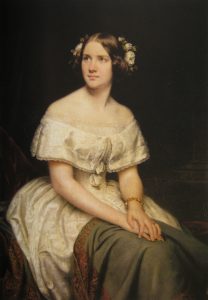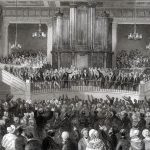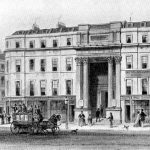Once the haunt of palaces lining the route to Westminster, and later a centre of musical theatre, the Strand today is epitomised by the Strand Palace hotel, easily walked past, but it is nevertheless rich in history.
The Strand Palace first welcomed guests in 1907 with a single room costing £5, (27 pence in today’s money). Luckily, the exciting art deco entrance to the hotel from the 1920’s jazz age is saved, although not on view and is locked away in the archive of the Victoria and Albert museum along with a supply of vintage photos of those bygone days.
A fine palace, Exeter House, stood here in Tudor times, granted by Queen Elizabeth 1 to William Cecil, Lord Burleigh, her most important advisor. Cecil extended his’ …London Palace’ apparently ‘creating an imposing mansion with four turrets, one in each corner with pleasure gardens and shimmering exotic trees such as lemon, orange and pomegranate’
Exeter House was replaced in 1676 by the Exeter Exchange which housed a menagerie containing exotic creatures. This became very popular and the painter Edwin Landseer, used to come and draw and paint the animals. Unfortunately, an elephant escaped and after a party of soldiers from neighbours across the way at (Old) Somerset House, failed to keep it at bay, the poor creature was harpooned and killed by the keeper manager.
Then the roaring lions were frightening the horses on the Strand, and it was replaced by Exeter Hall in 1831 starting anew, purposed for non-sectarian use for religious, scientific and philanthropic meetings.
Exeter Hall
Exeter Hall had a huge entrance with paired Corinthian columns holding about 5000 people and was extended even further in the 1860’s. It was used by the Ragged School Union, the Anti Corn Law League, the Royal Humane Society and as a symbol of Victorian meritocracy, to hold the new Civil service exams.
At the Anti-Slavery Society meeting here in 1840, the Prince Consort (Albert) made his first public appearance here and the Temperance Society held meetings here, though they felt compromised when they discovered that the cellars below were let to a wine merchant!! There was also the Sacred Harmonic Society who put on choral works, and Berlioz among others, conducted here.
The other lovely story about Exeter Hall, is of the German composer Felix Mendelssohn who had been commissioned by the Birmingham Musical Festival to compose Elijah, an oratorio to be performed, unusually, in English, the first performance was at Birmingham Town Hall in 1846.
The London performance of Elijah at Exeter Hall was in 1847, conducted by Mendelssohn. He is said to have written the soprano solos for a world famous and beautiful singer Jenny Lind who was popularly called ‘the Swedish Nightingale’ but it went ahead without her as she was unwilling to come to England. She is rumoured to have had an affair with Mendelssohn and certainly he was infatuated by her. Sadly, by late 1847, Mendelssohn had died.

The following year Jenny Lind finally performed Elijah and in Exeter Hall, as a fundraiser for the Mendelssohn scholarship fund, of which Arthur Sullivan of Gilbert and Sullivan fame was one of the first beneficiaries.
Exeter Hall was demolished in 1907 to make way for the hotel. The Strand and the Strand Palace Hotel have hidden depths and a hidden past both musical and historical. That is why coming on my Composers of the West End walk is such an eye opener whether you are a music buff or just plain curious, as there is more to hear!











